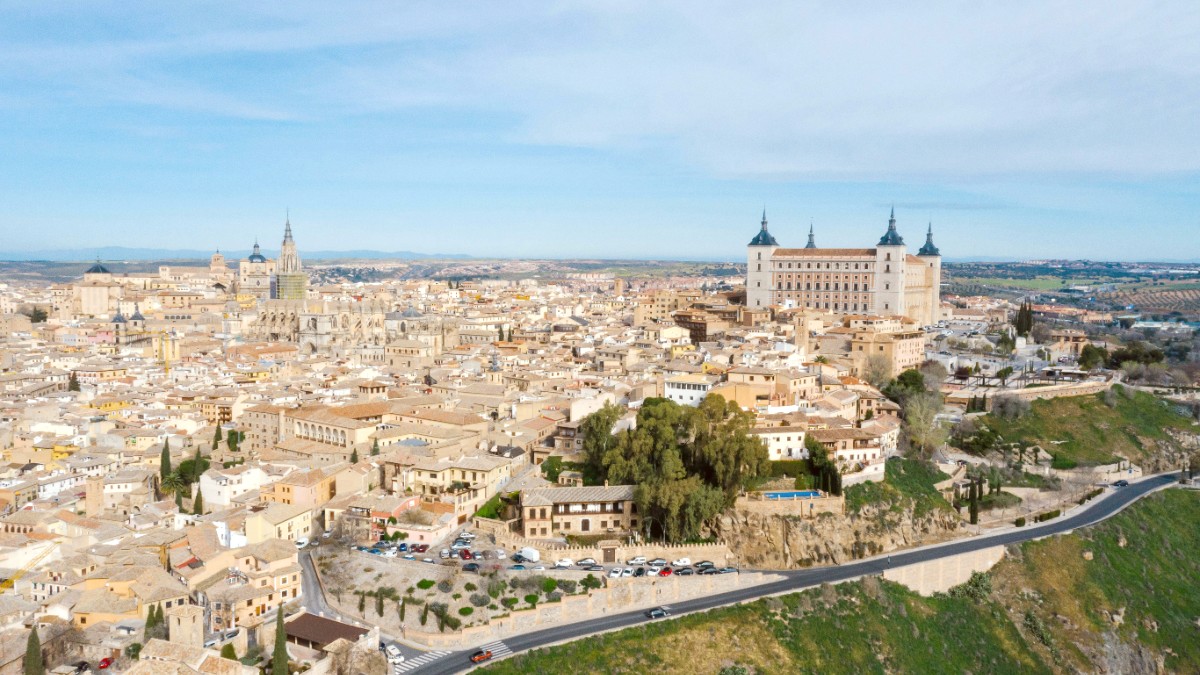
Castilla La Mancha, Spain
The Tagus River and its natural areas have environmental protection. Spain maintains numerous national and natural parks, highlighting a regional commitment to nature. Always dispose of litter properly in designated bins.
Spain has a recycling system with separate bins for paper (blue), plastic/metal/tetra paks (yellow), and glass (green). General waste goes into grey bins. Be mindful of water use during your stay due to potential scarcity, especially in drier periods.
Consider purchasing carbon offsets for your flights from reputable programs like Terrapass. Seek out hotels with sustainability certifications (Ecobnb). Support tour operators promoting responsible tourism like G Adventures.
Interact respectfully and contribute positively to local heritage.
Toledo holds UNESCO World Heritage city status. Continuous work focuses on preserving its historic structures and cultural heritage. Respect historic buildings and monuments; avoid defacing, littering, or climbing on ancient structures. Stick to marked paths to protect the sites.
Always greet shopkeepers and staff upon entering and leaving establishments (e.g., "Hola," "Gracias"). Dress modestly when visiting religious sites, covering shoulders and knees. Be discreet when photographing in public spaces and avoid pointing cameras into private homes. Always ask permission before taking close-up photos of individuals, especially children. Be mindful of noise levels in residential areas, specifically during siesta hours or late at night.
Prior to entry, cover your shoulders and knees. This applies to all visitors, male and female. Maintain silence, notably during ongoing services or prayers. Avoid speaking loudly, using mobile phones, or moving around during religious ceremonies. Pay close attention to any signs that restrict photography or video recording. Some areas strictly prohibit flash photography or any photography at all.
Be discreet when taking photos in public spaces. Avoid directing cameras into private homes or at individuals without their consent. If you choose to photograph a street performer, it is a kind gesture to offer a small contribution for their art. Always prioritize respect for privacy over capturing a shot. In religious sites and museums, always check for signs indicating photography restrictions.
Seek shops selling authentic local crafts directly from artisans to support fair pricing (Damascene, pottery).
Sustainable outdoor gear at PatagoniaConsider reusable products to minimize waste from places like Package Free Shop.
Conservation-minded goods at The Rainforest SiteChoose locally owned hotels, restaurants, cafes, and tour guides. Your spending directly benefits local families and preserves Toledo's unique character. If you wish to donate, choose established local charities or NGOs rather than giving to beggars on the street.
Ensure your visit contributes positively to the local community.
While Toledo may not have formal community-based tourism initiatives, your choices significantly impact the local economy. Opt for independent, locally owned businesses. This includes small family-run restaurants, artisan workshops, and guesthouses. Your patronage directly supports local livelihoods and helps sustain the unique character of the city.
When purchasing souvenirs, seek out shops that sell authentic local crafts, like Damascene or pottery, directly from the artisans. This practice helps to ensure that the creators receive a fair price for their work. Avoid buying mass-produced souvenirs, as these may not offer direct benefits to the local economy or artisans.
Remain aware of animal welfare issues. Avoid tours or attractions that involve mistreatment of animals or exploitative practices. Do not contribute to any form of exploitation, including child labor or unethical activities. Research any tours or experiences before participation to confirm their ethical standards. If you feel compelled to offer charity, donate through established local charities or non-governmental organizations (NGOs) instead of giving money to beggars on the street. This practice directs your contribution to those in need effectively.
Avoid attractions that mistreat animals or exploit them.
Steer clear of any activities involving child labor or unethical practices.
Donate via established local charities or NGOs for direct impact.